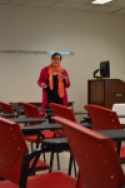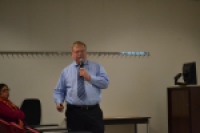Moderator Dr. Kevin Rioux introduced the two guest speakers for this information session: Associate Professor and Outreach librarians at St. John’s University, Caroline Fuchs and Adjunct Reference Librarian at Adelphi University, Robert Weiss to speak with the audience about connecting research to practice.
 Caroline Fuchs, with the aid of DLIS student Lisa Brigandi, presented a lesson from the field: Library Services for Student Veterans. Currently, St. John’s University is recognized as a Yellow Ribbon School, or a school with ample programs, support and facilities for student veterans. Fuchs described student vets as an isolated group of students that do not always adjust well to a university atmosphere.
Caroline Fuchs, with the aid of DLIS student Lisa Brigandi, presented a lesson from the field: Library Services for Student Veterans. Currently, St. John’s University is recognized as a Yellow Ribbon School, or a school with ample programs, support and facilities for student veterans. Fuchs described student vets as an isolated group of students that do not always adjust well to a university atmosphere.
St. John’s is working to provide student vets with a “go-to group of peers,” said Fuchs. As part of library outreach services, Fuchs recently administered a survey to student veterans on campus. As a result, the St. John’s library will play a reading role in providing aid and support to the student vet population. Currently, there is a library guide resource for student veterans to find information resources related to topics typically studied by student vets, including criminal justice, post traumatic stress disorder and medicine. Another library guide is currently being created to help librarians find resources for student vets. St. John’s libraries aim to meet student vet information needs in a greater way by adapting the collection development policy to reflect these needs.
Fuchs has an M.A. in English, History and Library Science. She has been awarded the Vincentian Research Fellowship, the Writing Across the Curriculum Faculty Fellowship and is a Senior Teaching and Technology Fellow. Brigandi is a first-year distance learner in the St. John’s DLIS program. She is currently employed in the North Carolina library system.
 Second speaker Robert Weiss delivered a look into Exploring the Relationships Between Research Libraries and Independent Publishers. Experienced in the field of academic librarianship, Weiss sought to explore the problems and possibilities of choosing publishing companies for library materials selection.
Second speaker Robert Weiss delivered a look into Exploring the Relationships Between Research Libraries and Independent Publishers. Experienced in the field of academic librarianship, Weiss sought to explore the problems and possibilities of choosing publishing companies for library materials selection.
Weiss began by stating book publishing is a historically low-profit industry. However, large publishing corporations have sought to increase revenues by adopting practices such as ghost writing and formula fiction. He then introduced ways in which the library can influence the publishing industry.
Libraries often have the choice to select materials from a large publishing corporation and vendor service or to select materials from a much smaller, independent company. Recent survey sought to indicate how libraries choose to select from which outlet and for what reasons. Of the libraries surveyed, approximately 1/3 did not even have a formal collection development policy, problematic for multiple reasons. In analyzing data about the choices between publishers, it was concluded that libraries benefit from independent, or “indie” publishing companies. However, libraries do not select materials from indies often because it is much more difficult to locate information-specific materials about books from indie publishers. Librarians have become accustomed to the vendor selection interface, which incorporates book reviews, to ease the selection process.
Overal, Weiss stressed the importance of librarian movement from out behind the computer screen. He urged librarians to visit book fairs, exhibitions and in-person ordering at smaller independent events. Librarians get lost inside these large vendor catalogs and should seek materials by alternative means, of course as budgets allow. Concluding with a quote from Barbara Fister, an author and librarian, “Publishers need librarians, who help spark a love of reading among children, sustain it through the stages of life, and know what’s important to readers.”
Weiss has a Ph.D in History from NYU and his MLS from St. John’s University. He has written a multitude of published scholarly articles in the library science and history fields. He has also authored, We Want Jobs: The History of Affirmative Action.
A recording of this session can be accessed here. (The Cisco WebEx add-on is required)

You must be logged in to post a comment.